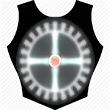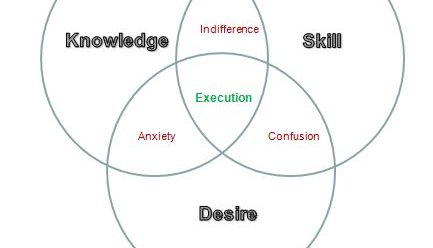From the Harmony Habit Tip Archives (May 2012):
“A habit is the intersection of
knowledge, skill and desire.”
~ Steven Covey
~~~~~~~~~~~~~~~~~~~~~~~~~~~~~~~~~~~~~~~
Reflection:
Steven Covey claims that in order to create a habit, work is required in 3 areas: we’ve got to know what we want, know how to create it, and, perhaps most importantly, we need to want to create it.
Without the real desire to develop a habit, Covey says, “No matter how many people give us feedback, or how many books we read, or how many seminars we attend or CDs we listen to, if we really don’t want to develop a particular habit, we never will.”
It’s the desire, or motivation, that is key to creating new habits.
This morning while I was out hiking, I shared Covey’s quote with my friend Barbara, and asked her what she thought about this concept, whether it rang true for her. “Absolutely!”she said, “I’ve spent a ton of money on health clubs, diet aids, self-help books, and seminars. I say I want to make exercise and fitness a priority; I intellectualize about it, yet I haven’t made it a habit. So I must want something else even more.”
“What else would that be?” I asked. “Sleeping in!” Barbara said laughing.
“The bigger question is…” Barbara continued, “…how do we know in our hearts what we really want to do?”
We continued the conversation over coffee. We looked at other habits we’d like to develop, like speaking up, becoming a better listener, thinking more positively, becoming more financially savvy – choosing actions that would move us closer to a vision of who we say we want to become.
 We agreed that, in most cases, we had the knowledge of what to do to achieve these goals; we even felt we had the skill; what we seemed to lack was the desire to make it a habit. We wondered: did we really want these things that we have said are so important?
We agreed that, in most cases, we had the knowledge of what to do to achieve these goals; we even felt we had the skill; what we seemed to lack was the desire to make it a habit. We wondered: did we really want these things that we have said are so important?
And that puzzled us, until we realized how much the question of “pain-versus-pleasure” had influenced our answers.
“What I really need to look at is what I want to achieve in the long run with exercise,” Barbara said, “Which is feeling good, and being healthy and in great shape. What really motivates me though is recognizing the pain I’d experience if I never achieved that. If I really thought about that, then the short term pleasure of sleeping in would lose out over the long term pain of never being really fit.”
Barbara’s insight made so much sense to me. I could easily see why I wasn’t achieving the results I was aiming for in certain areas of my life: I was giving in to short term “pleasure” – “wanting something else even more” – even though in the long term, that “something else” was far less important.
I had unconsciously associated more “pain” with the results I really wanted, which is why I wasn’t actively creating them.
From time to time, without knowing it, we all do this! I recently read an article about a consultant whose wife was thrilled when he had a big proposal to write because he always avoided the daunting task by cleaning their house first. Pain-versus-pleasure at work again!
In order to get what we really want, we need to first identify, and then question, the short term pleasure that may be blocking our ability to create what we truly desire.
When we can honestly answer: “Which do I really want more?” Then our knowledge, skill and true desirewill properly align, and we’ll be well on our way to creating new habits!
~~~~~~~~~~~~~~~~~~~~~~~~~~~~~~~~~~~~~~~
This month’s practice:
When we don’t achieve the results we say we want to accomplish, there is often a positive payoff for doing something else instead. This choice is often unconscious. Identifying the short term pleasure we get from not doing what we say we want to do, is an important first step to creating new habits that will ultimately help in achieving our goals.
Make a list of the things you say you’d like to do, or new habits you say you’d like to create, and haven’t made happen yet (or progressed as ideally as you’d like). See if you can identify the pleasure you derive from doing what you are doing, instead. Jot down whatever comes to mind, even if it sounds silly.
Your goal is to uncover the positive gain, then thoroughly investigate it:
- Do you really want this more than you want something else?
- Might you be willing to go outside your comfort zone to achieve what you really desire?
- What would happen if you never achieved what you wanted to accomplish?
- What great pleasure might you derive if you did?
- Are you willing to focus and hold your attention on this positive outcome instead?
Stay tuned! Next month we’ll look at how we can strengthen these habits so we can move more successfully in the direction of our goals.


